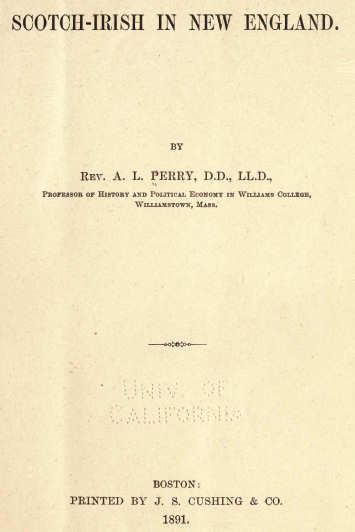
MR. PRESIDENT AND BRETHREN OF THE SOCIETY
The Scotch-Irish did not enter New England
unheralded. Early in the spring of 1718 Rev. Mr. Boyd was dispatched
from Ulster to Boston as an agent of some hundreds of those people
who expressed a strong desire to remove to New
England, should suitable encouragement be afforded them. His mission was
to Governor Shute, of Massachusetts, then in the third year of his
administration of that colony, an old soldier of King William, a
Lieutenant-Colonel under Marlborough in the wars of Queen Anne, and
wounded in one of the great battles in Flanders. Mr. Boyd was empowered
to make all necessary arrangements with the civil authorities for the
reception of those whom he represented, in case
his report of the state of things here should prove to be favorable.
As an assurance to the governor of the good faith and
earnest resolve of those who sent him, Mr. Boyd
brought an engrossed parchment twenty-eight inches square, containing
the following memorial to his excellency, and the autograph names of the
heads of the families proposing to emigrate:
"We whose names are underwritten, Inhabitants of ye
North of Ireland, Doe in our own names, and in the
names of many others, our Neighbors, Gentlemen,
Ministers, Farmers, and Tradesmen, Commissionate and appoint our trusty
and well beloved friend, the Eeverend Mr. William Boyd, of Macasky, to
His Excellency, the Eight Honorable Collonel Samuel Suitte, Governour of
New England, and to assure His Excellency of our sincere and hearty
Inclination to Transport ourselves to that very excellent and renowned
Plantation upon our obtaining from His Excellency suitable incouragement.
And further to act and Doe in our Names as his
prudence shall direct. Given under our hands this 26th day of March,
Anno Dom. 1718."
To this brief but explicit memorial, three hundred
and nineteen names were appended, all but thirteen of them in fair and
vigorous autograph. Thirteen only, or four per cent of the whole, made
their "mark" upon the parchment. It may well be
questioned, whether in any other part of the United Kingdom at that
time, one hundred and seventy-two years ago, in England or Wales, or
Scotland or Ireland, so large a proportion as ninety-six per cent of
promiscuous householders in the common walks of
life could have written their own names. And it
was proven in the sequel, that those who could
write, as well as those who could not, were also
able upon occasion to make their "mark".
Click here to
download this book (6Mb)

